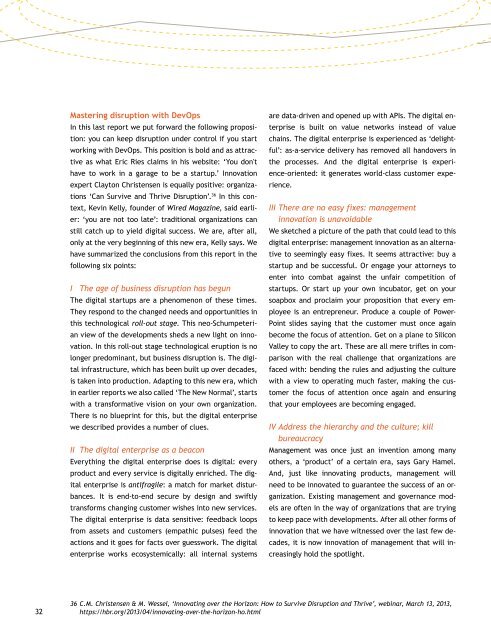DESIGN TO DISRUPT
1LHu2nv
1LHu2nv
Create successful ePaper yourself
Turn your PDF publications into a flip-book with our unique Google optimized e-Paper software.
Mastering disruption with DevOps<br />
In this last report we put forward the following proposition:<br />
you can keep disruption under control if you start<br />
working with DevOps. This position is bold and as attractive<br />
as what Eric Ries claims in his website: ‘You don't<br />
have to work in a garage to be a startup.’ Innovation<br />
expert Clayton Christensen is equally positive: organizations<br />
‘Can Survive and Thrive Disruption’. 36 In this context,<br />
Kevin Kelly, founder of Wired Magazine, said earlier:<br />
‘you are not too late’: traditional organizations can<br />
still catch up to yield digital success. We are, after all,<br />
only at the very beginning of this new era, Kelly says. We<br />
have summarized the conclusions from this report in the<br />
following six points:<br />
I The age of business disruption has begun<br />
The digital startups are a phenomenon of these times.<br />
They respond to the changed needs and opportunities in<br />
this technological roll-out stage. This neo-Schumpeterian<br />
view of the developments sheds a new light on innovation.<br />
In this roll-out stage technological eruption is no<br />
longer predominant, but business disruption is. The digital<br />
infrastructure, which has been built up over decades,<br />
is taken into production. Adapting to this new era, which<br />
in earlier reports we also called ‘The New Normal’, starts<br />
with a transformative vision on your own organization.<br />
There is no blueprint for this, but the digital enterprise<br />
we described provides a number of clues.<br />
II The digital enterprise as a beacon<br />
Everything the digital enterprise does is digital: every<br />
product and every service is digitally enriched. The digital<br />
enterprise is antifragile: a match for market disturbances.<br />
It is end-to-end secure by design and swiftly<br />
transforms changing customer wishes into new services.<br />
The digital enterprise is data sensitive: feedback loops<br />
from assets and customers (empathic pulses) feed the<br />
actions and it goes for facts over guesswork. The digital<br />
enterprise works ecosystemically: all internal systems<br />
are data-driven and opened up with APIs. The digital enterprise<br />
is built on value networks instead of value<br />
chains. The digital enterprise is experienced as ‘delightful’:<br />
as-a-service delivery has removed all handovers in<br />
the processes. And the digital enterprise is experience-oriented:<br />
it generates world-class customer experience.<br />
III There are no easy fixes: management<br />
innovation is unavoidable<br />
We sketched a picture of the path that could lead to this<br />
digital enterprise: management innovation as an alternative<br />
to seemingly easy fixes. It seems attractive: buy a<br />
startup and be successful. Or engage your attorneys to<br />
enter into combat against the unfair competition of<br />
startups. Or start up your own incubator, get on your<br />
soapbox and proclaim your proposition that every employee<br />
is an entrepreneur. Produce a couple of Power-<br />
Point slides saying that the customer must once again<br />
become the focus of attention. Get on a plane to Silicon<br />
Valley to copy the art. These are all mere trifles in comparison<br />
with the real challenge that organizations are<br />
faced with: bending the rules and adjusting the culture<br />
with a view to operating much faster, making the customer<br />
the focus of attention once again and ensuring<br />
that your employees are becoming engaged.<br />
IV Address the hierarchy and the culture; kill<br />
bureaucracy<br />
Management was once just an invention among many<br />
others, a ‘product’ of a certain era, says Gary Hamel.<br />
And, just like innovating products, management will<br />
need to be innovated to guarantee the success of an organization.<br />
Existing management and governance models<br />
are often in the way of organizations that are trying<br />
to keep pace with developments. After all other forms of<br />
innovation that we have witnessed over the last few decades,<br />
it is now innovation of management that will increasingly<br />
hold the spotlight.<br />
32<br />
36 C.M. Christensen & M. Wessel, ‘Innovating over the Horizon: How to Survive Disruption and Thrive’, webinar, March 13, 2013,<br />
https://hbr.org/2013/04/innovating-over-the-horizon-ho.html


